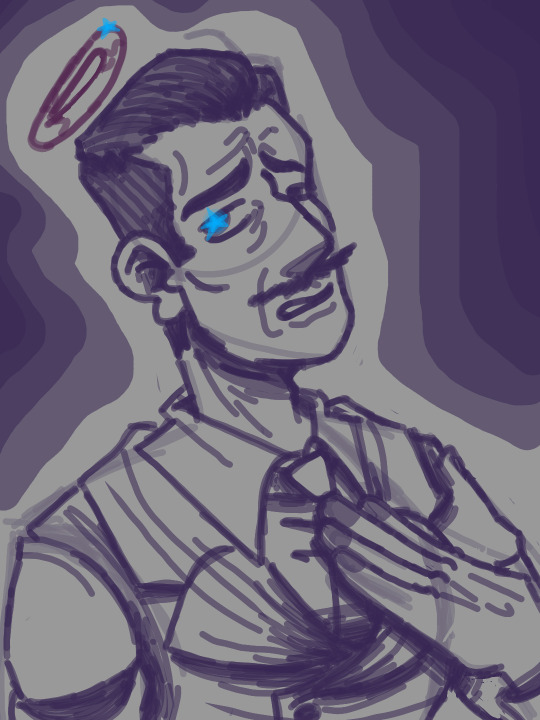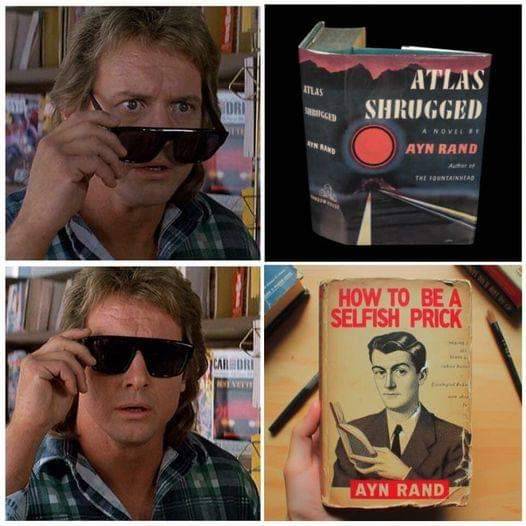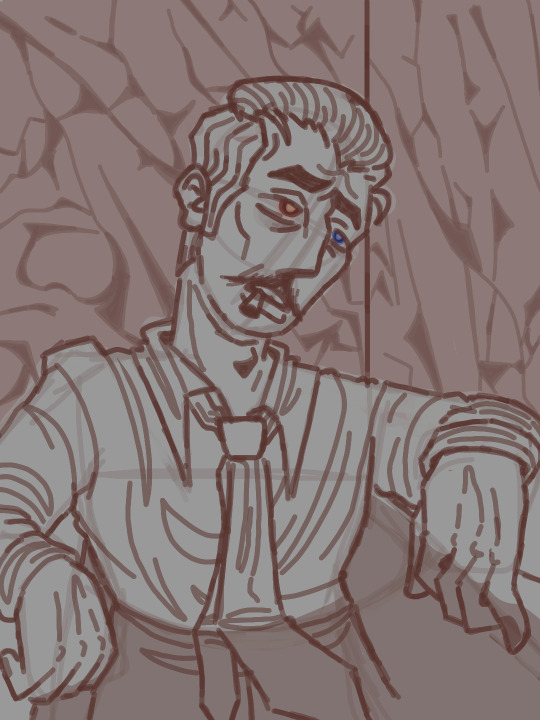#objectivism
Explore tagged Tumblr posts
Text
Lead toxicity was so common in the 1900s that it became the one of the most widespread poisons to the human brain, second only to Ayn Rand herself.
2K notes
·
View notes
Quote
Existence is Identity, Consciousness is Identification.
Ayn Rand, Atlas Shrugged
#Ayn Rand#Atlas Shrugged#quotelr#quotes#literature#lit#atlas-shrugged#consciousness#existence#john-galt#life#man#mind#morality#morals#objectivism#philosophy#pursuit-of-happiness#rational#reason#think#thinking#truth#values#virtue#wisdom
131 notes
·
View notes
Text

57 notes
·
View notes
Text
Objectivism vs. Subjectivism: Exploring the Philosophy of Universal Truth and Standards
Objectivism, when contrasted with subjectivism, is the philosophical stance that certain truths or values exist independently of individual perspectives, feelings, or cultural biases. Objectivism posits that reality and knowledge can be grounded in an objective, external framework, allowing for universal truths or principles that apply regardless of subjective interpretations.
Here’s an overview of key aspects in objectivist philosophy:
1. Metaphysical Objectivism
Reality as Independent of Perception: Metaphysical objectivism holds that reality exists independently of our perceptions, beliefs, or consciousness. There is a world "out there" that is structured and consistent, irrespective of individual viewpoints.
Contrast with Subjectivism: Subjectivism argues that our experiences shape reality, while objectivism asserts that reality remains unaffected by individual thoughts and emotions.
2. Epistemological Objectivism
Objective Knowledge: Objectivism asserts that knowledge is possible through reason, observation, and empirical evidence, and this knowledge can be universally applicable. Objective truth is something that can be approached and verified through logical and scientific methods, rather than being dictated by personal or cultural biases.
Universal Standards of Truth: Objectivist epistemology holds that through rational inquiry and consistent methodology, individuals can come closer to objective knowledge that transcends subjective perspectives. For example, scientific inquiry is often seen as an objective process, seeking truths that hold regardless of who performs the experiment.
3. Ethical Objectivism
Objective Moral Standards: In ethics, objectivism argues that moral truths exist independently of individual opinions. Ethical principles are seen as objective standards that apply universally, rather than being based on personal or cultural preferences. For instance, some argue that principles like "do no harm" have objective validity beyond subjective interpretations.
Contrast with Ethical Subjectivism: While ethical subjectivism argues that moral values are shaped by individual or cultural perspectives, objectivism claims that some ethical truths can be discovered rationally and apply to everyone equally.
4. Aesthetic Objectivism
Standards in Art and Beauty: Objectivism in aesthetics suggests that beauty and artistic quality are not merely “in the eye of the beholder,” but can be judged by objective standards, such as form, symmetry, and harmony.
Critique of Aesthetic Relativism: This view challenges the notion that art and beauty are purely subjective experiences, proposing instead that some aspects of artistic appreciation are universally recognizable.
5. Objectivism in Politics and Rights
Natural Rights and Universal Principles: Objectivist theories often emphasize natural rights or universal principles that should guide society. This includes beliefs that individuals have certain inherent rights and that laws and systems should reflect universal standards of justice.
Rejection of Relativism: Political objectivism opposes relativistic views that claim rights and justice vary between cultures, proposing instead that certain political ideals, like individual freedom or justice, are universally applicable.
Objectivism, as a counterpoint to subjectivism, argues that reality, truth, morality, and beauty are not simply personal or cultural constructs but are grounded in universal standards that can be discovered and understood objectively. By championing rationality and empirical evidence, objectivism seeks to transcend personal biases and achieve a shared understanding of truth and value, aiming to establish a coherent framework for ethics, knowledge, and rights that can apply universally.
#philosophy#epistemology#knowledge#learning#education#chatgpt#metaphysics#ontology#Objectivism#Subjectivism#Philosophy of Truth#Ethical Objectivism#Objective Knowledge#Aesthetic Objectivism#Universal Standards#Metaphysics#Epistemology#Moral Philosophy
17 notes
·
View notes
Text

Comment is on point here. She's such a fucking drag. Her most readable book! It's still as subtle as a brick and comically self-important, but that's Rand for you.
It's no surprise that they used AI art because all of Rand is just about stealing value from the workers and giving it to fuckwad Captains of Industry--who ideally should be burned alive by their workers in the first few pages of each book, just making them so much goddamn shorter. Who is John Galt? Well, ya see, it's more what is John Galt at this point...and the answer is crispy on the outside, medium rare near the bone.
So yeah, I'd read Rand if she included long scenes of billionaires being cooked in a communal fashion (not just like one serial killer cooking and eating them himself because I'm not a murderino or anything...I just believe in the devouring of the rich for the sustenance of the classes that are not billionaires).
#ayn rand#objectivism#fuck ayn rand#comment section#off the top ropes with the steel chair#fuck generative ai
13 notes
·
View notes
Text

my babygirl ryan :3
i made his pose a combination of comstock and cohen, and only realized that after i was done with it LOL
#kira.art#andrew ryan#bioshock#bioshock 1#bioshock andrew ryan#ayn rand#objectivism#bioshock fanart#digital art#art#i NEED him ilhsm PLEASEEE#i would do ANYTHING just for the chance to become cohen diane or jolene jus so i can be with him#ON MY HANDS AND KNEESSSSSSSS AAAAAA#im very normal about him
46 notes
·
View notes
Text
pain: an essay
Light is a major symbol in Anthem, a novel by Ayn Rand. Ayn Rand, the pseudonym of Alisa Zinovyevna Rosenbaum, was a Russian-American philosopher and writer. Her book Anthem is a story of a dystopian tale of a future where the individual has been eradicated. The protagonist, a young man called Equality 7-2521, discovers history has been hidden from the population, as well as the concept of the individual. The themes of the novel--the importance of identity and the merit of martyrdom--were heavily influenced by Rand's personal philosophy, Objectivism; the principle of her philosophy relevant to the discussion of Anthem is the importance of the morally correct prioritizing of own's own happiness. Anthem's use of the symbol of light, namely the candle and the lightbulb, leads the way to Equality 7-2521's discovery of the words "I" and "ego". The concept of Objectivism and the symbolism of light further extends to who Equality 7-2521 names himself after--Prometheus, the myth of the Greek titan who brought light to humans, then was punished for it by the gods. In the novel Anthem, light symbolizes discovery of the truth of self, as well as Prometheus' development as a character.
The light of the candle and the lightbulb symbolizes how Prometheus realizes the hidden histories and underlying problems with the way his society is run. The background I created is of a candle with forks of lightning branching out from the candle. The wallpaper is a clear symbol of the candle, which at first in the novel was restricted from the main population, but becomes the gateway to Prometheus' journey, and the lightbulb, which both was the cause of the protagonist's exile and his salvation. On two pages, evidence is found: "We stole the candle from the larder of the Home of the Street Sweepers…the light is precious…we need it for that work which is our crime" (Rand 6) and "We have stolen candles from the Home of the Street Sweepers…we sit in the tunnel…and we study" (Rand 29). The candle allowed Prometheus to discover things of science and of writing. The lightning in the wallpaper represents electricity and the lightbulb in the novel. In Part Five, the text is, "…a box of glass, devised to give forth the power of the sky…and when we put our wires to this box, when we closed the current--the wire glowed! It came to life…a circle of light…" (Rand 58) and then in Part Seven, "And all the others cried as one" "It must be destroyed!" Then we leapt to the table. We seized our box…we ran to the window…we ran…We were in the Uncharted Forest" (Rand 78-79). The transition from the candle to the more advanced lightbulb demonstrates Prometheus' development as a character, how he discovers more and more complex ideas, and finally escapes the constrictions of the City. In summary, the symbol of light is multifaceted, representing many different ideas of the novel.
Light as a symbol represents development and discovery. It led Prometheus through the journey of learning history and individuality through very literally lighting the way to previously hidden resources. Light permeates the whole story; it's entwined with each and every point of the plot. My analysis and evidence presented exemplifies and confirms my thesis.
#yes i wrote all this bouta kms#essay#ayn rand#objectivism#anthem#anthem ayn rand#uh#philosophy#?#i guess#symbolism#idek man this took two hours and seven wikipedia hours
3 notes
·
View notes
Text
Dagny Taggart is on TikTok!
13 notes
·
View notes
Text

illustration from Donald Trump’s trade follies presage more protectionism
“It is certainly true that our age is full of conflicts which generate war. However, these conflicts do not spring from the operation of the unhampered market society. It may be permissible to call them economic conflicts because they concern that sphere of human life which is, in common speech, known as the sphere of economic activities. But it is a serious blunder to infer from this appellation that the source of these conflicts are conditions which develop within the frame of a market society. It is not capitalism that produces them, but precisely the anticapitalistic policies designed to check the functioning of capitalism. They are an outgrowth of the various governments’ interference with business, of trade and migration barriers and discrimination against foreign labor, foreign products, and foreign capital.
None of these conflicts could have emerged in an unhampered market economy. Imagine a world in which everybody were free to live and work as entrepreneur or as employee where he wanted and how he chose, and ask which of these conflicts could still exist. Imagine a world in which the principle of private ownership of the means of production is fully realized, in which there are no institutions hindering the mobility of capital, labor, and commodities, in which the laws, the courts, and the administrative officers do not discriminate against any individual or group of individuals, whether native or alien. Imagine a state of affairs in which governments are devoted exclusively to the task of protecting the individual’s life, health, and property against violent and fraudulent aggression. In such a world the frontiers are drawn on the maps, but they do not hinder anybody from the pursuit of what he thinks will make him more prosperous. No individual is interested in the expansion of the size of his nation’s territory, as he cannot derive any gain from such an aggrandizement. Conquest does not pay and war becomes obsolete.
(…)
Two hundred years ago it was of little concern to the Swedes or the Swiss whether or not a non-European country was efficient in utilizing its natural resources. But today economic backwardness in a foreign country, endowed by rich natural resources, hurts the interests of all those whose standard of living could be raised if a more appropriate mode of utilizing this natural wealth were adopted. The principle of each nation’s unrestricted sovereignty is in a world of government interference with business a challenge to all other nations. The conflict between the have-nots and the haves is a real conflict. But it is present only in a world in which any sovereign government is free to hurt the interests of all peoples — its own included — by depriving the consumers of the advantages a better exploitation of this country’s resources would give them. It is not sovereignty as such that makes for war but sovereignty of governments not entirely committed to the principles of the market economy.
Liberalism did not and does not build its hopes upon abolition of the sovereignty of the various national governments, a venture which would result in endless wars. It aims at a general recognition of the idea of economic freedom. If all peoples become liberal and conceive that economic freedom best serves their own interests, national sovereignty will no longer engender conflict and war. What is needed to make peace durable is neither international treaties and covenants nor international tribunals and organizations like the defunct League of Nations or its successor, the United Nations. If the principle of the market economy is universally accepted, such makeshifts are unnecessary; if it is not accepted, they are futile. Durable peace can only be the outgrowth of a change in ideologies. As long as the peoples cling to the Montaigne dogma and think that they cannot prosper economically except at the expense of other nations, peace will never be anything other than a period of preparation for the next war.
Economic nationalism is incompatible with durable peace. Yet economic nationalism is unavoidable where there is government interference with business. Protectionism is indispensable where there is no domestic free trade. Where there is government interference with business, free trade even in the short run would frustrate the aims sought by the various interventionist measures.
(…)
There is no use in conjuring away these conflicts by wishful thinking. What is needed to make peace durable is a change in ideologies. What generates war is the economic philosophy almost universally espoused today by governments and political parties. As this philosophy sees it, there prevail within the unhampered market economy irreconcilable conflicts between the interests of various nations. Free trade harms a nation; it brings about impoverishment. It is the duty of government to prevent the evils of free trade by trade barriers. We may, for the sake of argument, disregard the fact that protectionism also hurts the interests of the nations which resort to it. But there can be no doubt that protectionism aims at damaging the interests of foreign peoples and really does damage them. It is an illusion to assume that those injured will tolerate other nations’ protectionism if they believe that they are strong enough to brush it away by the use of arms. The philosophy of protectionism is a philosophy of war. The wars of our age are not at variance with popular economic doctrines; they are, on the contrary, the inescapable result of a consistent application of these doctrines.�� - Ludwig von Mises, ‘Human Action: A Treatise on Economics’ (1949) [p. 680 - 683]
“In a full dictatorship, statism's chronic "cold" civil war takes the form of bloody purges, when one gang deposes another—as in Nazi Germany or Soviet Russia. In a mixed economy, it takes the form of pressure-group warfare, each group fighting for legislation to extort its own advantages by force from all other groups.
The degree of statism in a country's political system, is the degree to which it breaks up the country into rival gangs and sets men against one another. When individual rights are abrogated, there is no way to determine who is entitled to what; there is no way to determine the justice of anyone's claims, desires or interests. The criterion, therefore, reverts to the tribal concept of: one's wishes are limited only by the power of one's gang. In order to survive under such a system, men have no choice but to fear, hate and destroy one another; it is a system of underground plotting, of secret conspiracies, of deals, favors, betrayals and sudden, bloody coups.
It is not a system conducive to brotherhood, security, cooperation and peace.
Statism—in fact and in principle—is nothing more than gang rule. A dictatorship is a gang devoted to looting the effort of the productive citizens of its own country. When a statist ruler exhausts his own country's economy, he attacks his neighbors. It is his only means of postponing internal collapse and prolonging his rule. A country that violates the rights of its own citizens, will not respect the rights of its neighbors. Those who do not recognize individual rights, will not recognize the rights of nations: a nation is only a number of individuals.
Statism needs war; a free country does not. Statism survives by looting; a free country survives by production.
(…)
Laissez-faire capitalism is the only social system based on the recognition of individual rights and, therefore, the only system that bans force from social relationships. By the nature of its basic principles and interests, it is the only system fundamentally opposed to war.
Men who are free to produce, have no incentive to loot; they have nothing to gain from war and a great deal to lose. Ideologically, the principle of individual rights does not permit a man to seek his own livelihood at the point of a gun, inside or outside his country. Econom-ically, wars cost money; in a free economy, where wealth is privately owned, the costs of war come out of the income of private citizens-there is no overblown public treasury to hide that fact-and a citizen cannot hope to recoup his own financial losses (such as taxes or business dislocations or property destruction) by winning the war. Thus his own economic interests are on the side of peace.
In a statist economy, where wealth is "publicly owned," a citizen has no economic interests to protect by preserving peace—he is only a drop in the common bucket—while war gives him the (fallacious) hope of larger handouts from his masters. Ideologically, he is trained to regard men as sacrificial animals; he is one himself; he can have no concept of why foreigners should not be sacrificed on the same public altar for the benefit of the same state.
(…)
The essence of capitalism's foreign policy is free trade—i.e., the abolition of trade barriers, of protective tariffs, of special privileges—the opening of the world's trade routes to free international exchange and competition among the private citizens of all countries dealing directly with one another. During the 19th century, it was free trade that liberated the world, undercutting and wrecking the remnants of feudalism and the statist tyranny of absolute monarchies.
"As with Rome, the world accepted the British empire because it opened world channels of energy for commerce in general. Though repressive (status) government was still imposed to a considerable degree on Ireland with very bad results, on the whole England's invisible exports were law and free trade. Practically speaking, while England ruled the seas any man of any nation could go anywhere, taking his goods and money with him, in safety." (The God of the Machine, by Isabel Paterson, Caldwell, Idaho: Caxton Printers, 1964, p. 121. Originally published by G. P. Putnam's Sons, New York, 1943.)
As in the case of Rome, when the repressive element of England's mixed economy grew to become her dominant policy and turned her to statism, her empire fell apart. It was not military force that had held it together.
Capitalism wins and holds its markets by free competition, at home and abroad. A market conquered by war can be of value (temporarily) only to those advocates of a mixed economy who seek to close it to international competition, impose restrictive regulations and thus acquire special privileges by force. The same type of businessmen who sought special advantages by government action in their own countries, sought special markets by government action abroad. At whose expense? At the expense of the overwhelming majority of businessmen who paid the taxes for such ventures, but gained nothing. Who justified such policies and sold them to the public? The statist intellectuals who manufactured such doctrines as "the public interest" or "national prestige" or "manifest destiny."” - Ayn Rand, ‘The Roots of War’ (June 1966)
#mises#ludwig von mises#human action#economics#economy#trump#protectionism#trade#war#ayn rand#isabel paterson#intervention#interventionism#liberty#libertarian#libertarianism#objectivism#capitalism#free#statism#etatism
3 notes
·
View notes
Text

3 notes
·
View notes
Quote
Neither life nor happiness can be achieved by the pursuit of irrational whims. Just as man is free to attempt to survive in any random manner, but will perish unless he lives as his nature requires, so he is free to seek his happiness in any mindless fraud, but the torture of frustration is all he will find, unless he seeks the happiness proper to man. The purpose of morality is to teach you, not to suffer and die, but to enjoy yourself and live.
Ayn Rand, Atlas Shrugged
#Ayn Rand#Atlas Shrugged#quotelr#quotes#literature#lit#atlas-shrugged#evil#good#happiness#john-galt#life#man#mind#morality#morals#objectivism#philosophy#pursuit-of-happiness#rational#reason#think#thinking#values#virtue
21 notes
·
View notes
Text
Thought on John Galt
John Galt in "Atlas Shrugged" is actually an archetypal mad scientist in-universe (he hits a lot of the tropes and story beats), therefore his philosophy should, diegetically, not be taken seriously, because... well, he's a mad scientist. Let me know if you want me to elaborate.
5 notes
·
View notes
Text

5 notes
·
View notes
Text
The Philosophy of Objectivism
Objectivism is a philosophy developed by Russian-American philosopher Ayn Rand, which emphasizes rational self-interest, individualism, and the pursuit of one's own happiness as the highest moral aim. It advocates for a laissez-faire capitalist society, where individual rights are paramount and the role of government is limited to protecting these rights through law enforcement, military, and the courts.
Here’s a breakdown of the central tenets of Objectivism:
1. Metaphysics: Reality Exists Independently of Perception
Objective Reality: Objectivism holds that there is an objective reality that exists independent of human consciousness or perception. The universe is what it is, and facts are facts, regardless of what anyone thinks or believes.
Rejects Mysticism: Rand rejects any form of mysticism or supernaturalism, asserting that reality is objective and can be understood through reason.
2. Epistemology: Reason as the Only Means of Knowledge
Rationality: Reason, defined as the faculty that identifies and integrates the material provided by the senses, is seen as the only reliable way to gain knowledge. Objectivism rejects any reliance on faith, emotions, or authority as a means to know reality.
Conceptualization: Human beings form concepts based on sensory input and must use reason to understand the world. Objectivism places a strong emphasis on logic and the scientific method.
3. Ethics: Rational Self-Interest
Moral Egoism: Objectivism promotes the idea of rational self-interest, where individuals should pursue their own happiness as their highest moral purpose. Altruism, or the idea that one should sacrifice for others, is seen as a destructive moral code. Rand argues that self-sacrifice undermines human flourishing.
Virtues of Rationality: Key virtues in Objectivist ethics include rationality, independence, integrity, honesty, justice, and pride. According to Rand, these virtues guide individuals toward a life of purpose, productivity, and personal fulfillment.
Happiness as the Moral Purpose: The ultimate ethical goal in Objectivism is the pursuit of one’s own happiness, which is achieved by living rationally, productively, and in harmony with reality.
4. Politics: Individual Rights and Capitalism
Individual Rights: Rand argues that each person has the right to live for their own sake, without interference from others. The central political principle of Objectivism is that the only moral social system is one in which individuals have the freedom to act according to their own judgment.
Capitalism: Objectivism supports laissez-faire capitalism, viewing it as the only economic system that fully respects individual rights. In a capitalist society, interactions between people are voluntary, and the government’s role is limited to protecting individual rights from force or fraud.
Non-Initiation of Force Principle: One of the fundamental political principles is that no one has the right to initiate force against others. The government’s role is to protect individuals from the initiation of force by others, whether by individuals or groups.
5. Aesthetics: Art as a Celebration of Life
Romantic Realism: In aesthetics, Rand advocates for romantic realism, where art reflects what life can and ought to be. Art, according to Objectivism, should inspire and uplift, depicting the ideal man and the potential for greatness in human beings.
Purpose of Art: Rand sees art as a spiritual need that allows individuals to project their most deeply held values and to contemplate the idealized vision of life. Art is not a tool for conveying societal or political messages, but rather for reflecting the creator’s vision of what is possible and desirable.
Criticism of Objectivism:
Criticism of Ethical Egoism: Critics argue that Rand’s emphasis on self-interest as the highest moral virtue can lead to a lack of empathy and disregard for the well-being of others, which could harm social cooperation and cohesion.
Overemphasis on Capitalism: Rand’s vision of laissez-faire capitalism has been criticized for its perceived neglect of social welfare and collective responsibility. Critics contend that unchecked capitalism can lead to inequality, exploitation, and environmental degradation.
Absolutism in Moral and Political Philosophy: Some philosophers argue that Rand's moral and political theories are too rigid, failing to account for the complexity of moral dilemmas or the importance of social cooperation beyond voluntary exchange.
Objectivism offers a radically individualistic framework, emphasizing personal responsibility, rational thought, and the pursuit of individual happiness within a framework of capitalist ethics and individual rights.
#philosophy#epistemology#knowledge#learning#education#chatgpt#ontology#metaphysics#ethics#Objectivism#Ayn Rand#Individual Rights#Rational Self-Interest#Moral Egoism#Laissez-Faire Capitalism#Reason and Reality#Romantic Realism
6 notes
·
View notes
Text

#fuck ayn rand#they live#rowdy roddy piper#ayn rand#objectivism#objectivise my ass#atlas shrugged#more like atlas sucked
38 notes
·
View notes
Text
andrew ryan doodles <3




i said i had a semi art block, so im forcing myself to get out of it by using references and trying to replicate them :)
#kira.art#bioshock#andrew ryan#bioshock andrew ryan#bioshock 1#bioshock fanart#fanart#art reference#ayn rand#objectivism#in actuality cohen or jolene probably kissed ryan in the first pic#but to make myself more delusional im gonna say i did it#i love that 50 sum year old man#hes so babygirl coded#pookie bear coded also
20 notes
·
View notes